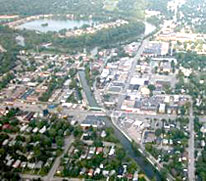
|
Broad Ripple Random Ripplings

The news from Broad Ripple
Brought to you by The Broad Ripple Gazette
(Delivering the news since 2004, every two weeks)

|
| Brought to you by: |

|

|

|

|

|

|
Converted from paper version of the Broad Ripple Gazette (v14n13)
Norris Archer biography - Scout since 1935 - by Mario Morone
posted: Jun. 23, 2017
Norris Archer recalled his time in the Scout Band of America. "I'm very proud of our band that I was a member of in 1937. I played the drums. At that time, I was a scout in Troop 73. I've lived in Indianapolis all of my life. I wrote a book called, "Chank-tun-un-gi" (Chief F.O. Belzer) about Camp Belzer's 100th birthday that will be celebrated next year and have been asked to print copies for its 100th Anniversary."
Norris Archer receiving the Minisino Award in 2015.
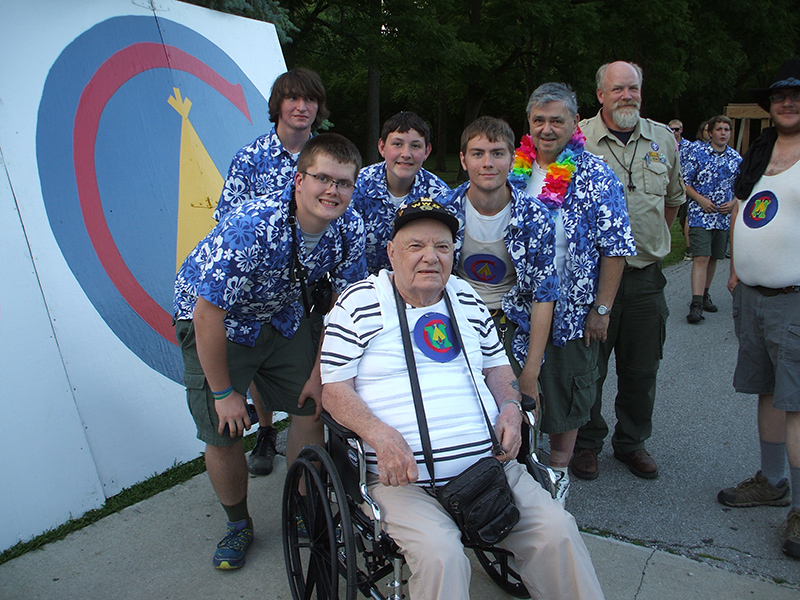
image courtesy of Mario Morone
"There was a boy named Walter Carter who was a school chum of mine. We were 12 years old in December of 1935. Walter invited me to go to a scout meeting at Arsenal and 12th Street on the east side of Indianapolis. I was an Eagle Scout in 1939 and they made me a Minisino a few years ago. It is an honorary award within the Crossroads of America Council. I believe I was the oldest candidate for Minisino, but when somebody read my book, they nominated me for the award. The book was published November 27, 2009," Archer stated.
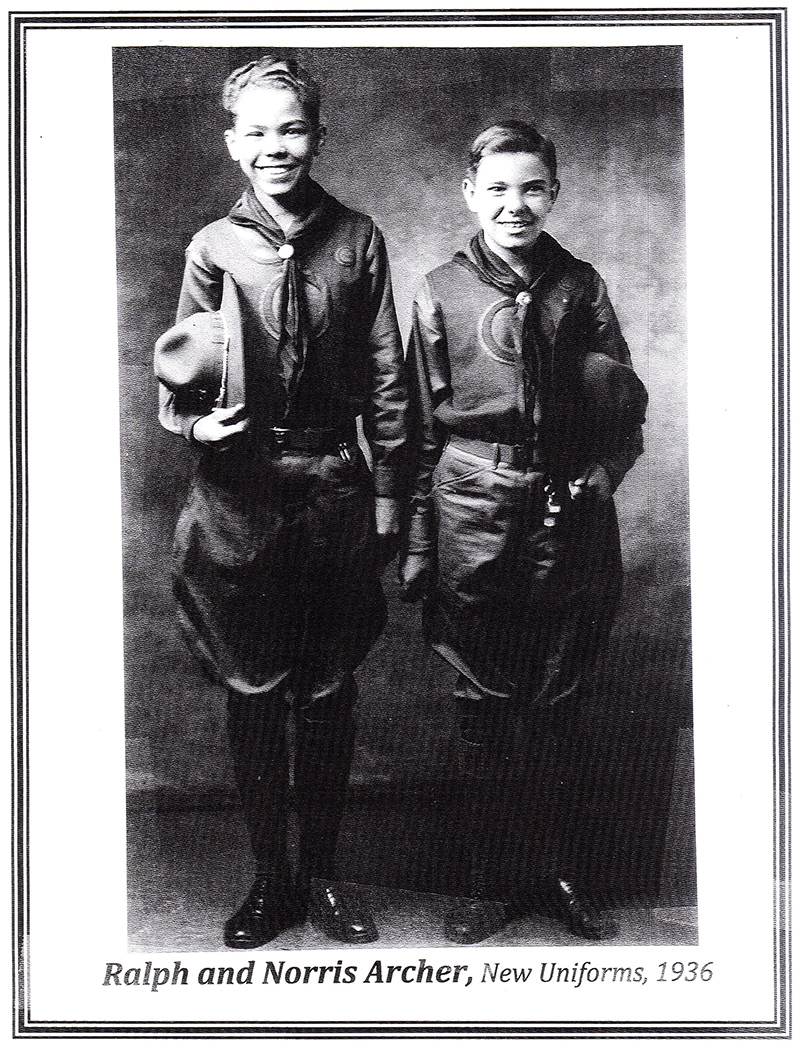
image courtesy of Norris Archer
| Brought to you by: |

|

|

|
"We (our family) were poor at the time and couldn't afford official Boy Scout uniforms. My parents acquired a pair of 'Sweet Ore' pants and made patterns for our uniforms. Sweet Ore was a trade name for the Boy Scout Uniforms in those days. I needed some money to attend my first scout meeting, so my mother took her piggy bank and shook 10 pennies out of it for me to attend. From 1936 to 1940, I attended camp every year and sold donuts to earn money to go to camp. I knew Mrs. Murphy who was in charge of the camp kitchen and she got me the job working in the mess hall washing dishes and cleaning up after each meal," he said.
"Some things I remember the most about the band was when my brother, Ralph and I walked five miles round trip on Saturday mornings to band practice from Newman Street and East 10th Street, which was right in front of the Theodore Potter Fresh Air School (originally a school for children who had tuberculosis) to Alabama and New York Street at the old Indianapolis Fire Department Headquarters. It was a two-story building. The junior band practiced at 10 a.m. and the senior band practiced at 11 a.m. The music we practiced was mostly marches. Ralph was an excellent tenor saxophonist who also played clarinet and soprano saxophone. We both played in the ROTC band at Tech High School; however, I played the cymbals rather than the drums in the ROTC band - the cymbals were the center of the band in most formations. If Mr. Oster (the band leader), liked you in one band, he would put you in the other band," Archer noted.
"Our scout troop had weekend camps in the woods. In 1936, my brother Ralph and I were the first to sign up for winter camp. We went through a lot of exercises that tried to get us better acquainted with nature in the woods. We would sleep in the K Hut that was built by the Kiwanis Club. It was burnt down not too long ago by vandals," he added.
"I graduated from Tech High School in 1941. I was in the ROTC there. The band director, R.G. Oster, also directed the Boy Scout Band at that time. In 1941, we had the largest graduating class ever, about 1,300 to 1,400 people. We had to have our graduation ceremony at Butler University's Hinkle Field house. I was a vocational student in metal working and spent four periods a day in shop classes and graduated with a vocational certificate. We never gave a second thought to going to college," Archer said.
Like many young men in his generation, he served his country in World War II. "I was drafted into the Army and later was assigned to the Americal Division (a combination of America and New Caledonia) in the 52nd Combat Engineer Battalion while serving in the Pacific and in Japan. For a short time in the Pacific, I was assigned to the 81st Wildcat Division as a weapons sergeant. There were three of us to a company. We basically had the job of keeping the arms in our unit in good condition. I was trained to make some repairs on rifles and machine guns. We were stationed in Honolulu for jungle training in April of 1944 and discharged from Japan in December of 1945."
Archer's family has an extensive armed services background. "There are 125 years of military service in our family. My son, David M. Archer, is a retired army colonel who served for 27 years. He spent his freshman year at Broad Ripple High School. He graduated from Warren Central High School. He majored in business administration at Indiana University. He was in the ROTC at IU and graduated as second lieutenant. My second son, Robert W. Archer, was a retired navy captain, who served 38 years. He graduated from Monrovia High School before enlisting in the Navy. He died two years after retirement from pancreatic cancer in 2009 and is buried in Arlington National Cemetery."
Archer began work shortly after military duty. "After being discharged from the service on the day before Christmas of 1945, I went to work as a welder on the day after New Year's welding portable gasoline tanks. In September of 1946, a former school teacher asked me if I wanted to work with a friend of his that was starting a company to make aluminum storm windows and awnings (O.O. McKinley Company). I later became foreman and then superintendent of the company. A few years later, we made all kinds of architectural products."
He continued, "I went to the Chrysler Foundry as millwright foreman for about three years, but left as the work was too dangerous. I later returned to the O.O. McKinley Company where I became superintendent of the plant and field. I worked in Long Island, New York where I overhauled concession stands and hired union workers. Raceway Park was owned by the Ironworkers of Brooklyn, New York. We did architectural work all over the country, but many times, we shipped material around the country and local people installed it. Overall, I worked at O.O. McKinley about 14 years. Late in 1961, I changed jobs and went to the Emerson Engineering Company as Vice President of Manufacturing for about 10 years. We made a variety of products, such as fireproof doors, door frames for auditoriums and door frames for new construction," he described.
Archer's career took a new direction. "In 1968, I decided to fly an airplane and later earned my commercial pilot's license. I co-piloted with Max Jobst with the Indianapolis Air Charter. I always handled a lot of the radio communications on the plane. I met Bill Kuhn (owner of Bill Kuhn Chevrolet in Broad Ripple). In the early 1970s, I was employed at the Indianapolis Airport Authority as Construction Coordinator during their remodeling program of the Terminal Building. I had an instrument pilot certification with a Multi-Engine rating. Due to the restriction of being color blind, I flew smaller commercial planes, like Cessna 340s and mostly Piper Cherokees and Piper Aztecs. I never flew any larger planes and couldn't tell the difference between red and green signals and flew mostly in daylight conditions. I flew around the eastern part of the United States and as far west as Kansas City and to Minneapolis. I retired from the Indianapolis Airport Authority in 1980, then I joined the Legal Division of the City of Indianapolis as the Contracts Compliance Officer."
"After I retired, I was recognized as the Small Business Advocate of the year for Indiana by the Small Business Administration in Washington D.C. I started receiving letters from people I didn't know congratulating me on my achievement and was given credit for promoting millions of dollars into small businesses, particularly minority and female owned business. That was in the years they were trying to get women and minorities government contracts. I continued working as a volunteer on government committees after retirement," Archer said.
He met long-time community leaders that had a lasting influence on his career and life. "I met Sam Jones when he was Chairman of the Board at Martin University in the early 1970s. He was also President of the Indianapolis Urban League. Father Boniface Hardin and Sister Jane Shilling founded Martin Center College in 1975, which later became Martin University. We became good friends. It was through Boniface Hardin that I became associated with Civil Rights and Affirmative Action. He met me at the airport and wanted me to be on their board of directors. I told him that I wasn't a college graduate and said I would like to attend his school. They sent me an application. I had college credits at IUPUI, Butler University and Indiana Central University. They did an assessment of my prior learning where I tested out of a lot of credits. It took me about three years to earn my degree. I was the first person to have a ceremony in Mayor Hudnut's conference room and the fourth graduate of Martin University (formerly known as Martin Center College). When I became Chairman of the Board from 1981 to 1983, we changed the name to Martin University. After Father Hardin died, I recommended the streets on the east side to be named in his memory, which they did a few years later."
His return to higher education became complete. "At age 58, I earned my college degree in Community Organization with a dual major in Business Management from Martin University. I wrote a book called, 'Retirement and Then Some,' that tells the story of Martin University."
His public service work included a connection with a political icon. "I was Public Affairs Administrator for the Indianapolis International Airport for about 10 years during the 1970s. I went to the City of Indianapolis with Mayor Bill Hudnut where I wrote many of the civil rights contracts that attorneys had to approve. I represented Mayor Bill several times at meetings and dinners when he could not attend them."
Indianapolis Mayor Bill Hudnut presents Norris Archer with his Martin University degree on April 12, 1982.
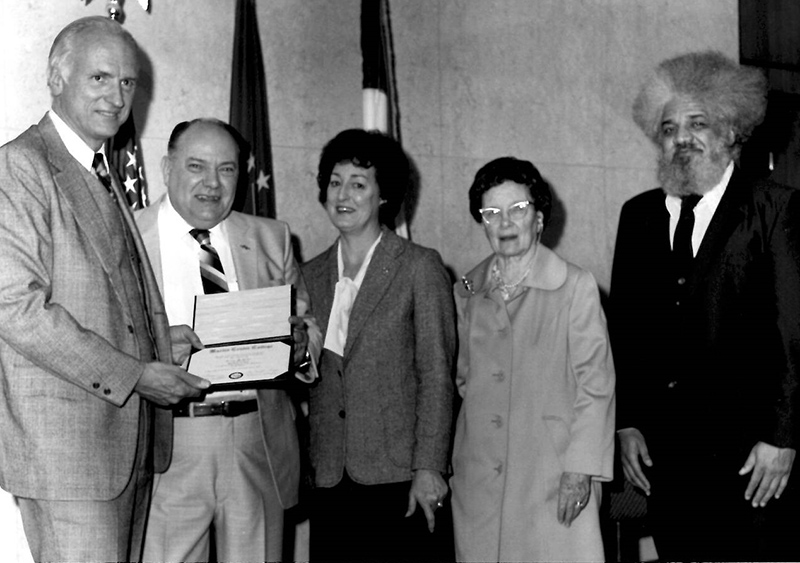
image courtesy of Norris Archer
Archer recalled his affiliation with the founder of Camp Belzer. "Chief Belzer organized the entire Crossroads of America Council in 1909 and 1910. I was a close acquaintance of the Chief. He was a counselor for a Merit Badge that I earned in Woodcarving. I have been a speaker for several meetings at the Scout Camp and sang many of the old songs the boys like to hear."
Archer described the various areas of scouting that were developed. "When Chief Belzer organized the camp, he created four levels for the boys to work for camp ranks, Camper (similar to tenderfoot rank), Woodsman (swimming at least 50 feet was a requirement), Firecrafter (directed towards developing leadership, which is one of their big focal points), and Minisino (honorary type where there are no requirements where one has to have done something of honor). In my case, I may have been recognized for writing 'History of the Crossroads of America,' that is a history of the Boy Scouts Worldwide."
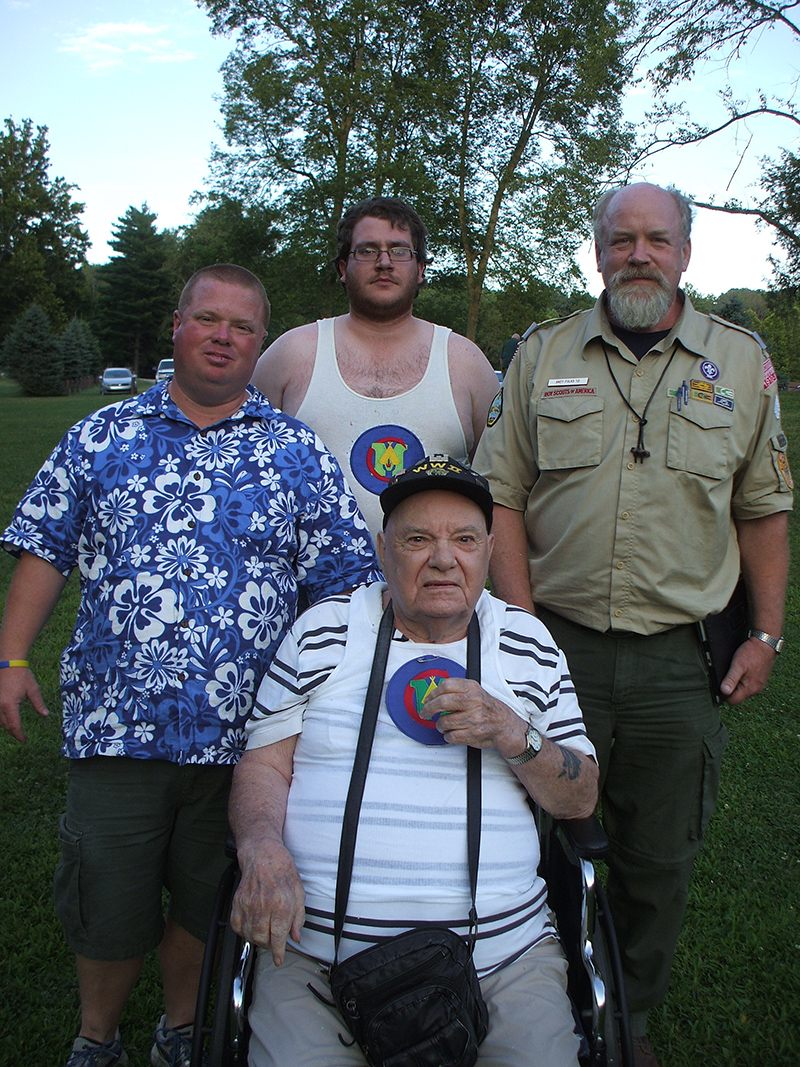
image courtesy of Mario Morone
| Brought to you by: |

|

|

|
A sibling of Archer's followed his footsteps into scouting. "I had another brother, Lester, who was 10 years younger, that was in the Boy Scouts, too. He passed away in 1978 from multiple sclerosis."
Archer's prolific career as a writer began in recent years. "I started writing in 2006 after I had fallen and broken a hip. I was limited to what I could do. My family got me a word processor and that's where I began. I never started writing to make money, but only for the enjoyment of it. The first book I wrote, "Where are you going, Soldier?" is about my military life. I've sold my books in various countries, like Australia, Philippines, Saudi Arabia and Iraq through my website, fcsutler.com/norrisbooks.asp.
With a distinguished career in industry and public service, Norris Archer reflected, "Who knows for sure as to what part in my life being in the Scout Band may have played, but I always will remember the lesson(s) I learned about the merits of working together."
Norris Archer is expected to appear at Camp Belzer during the Scout Band's 100th Anniversary the week of July2-8th.

|

|

|
| Brought to you by: |

|

|

|
| Brought to you by: |


